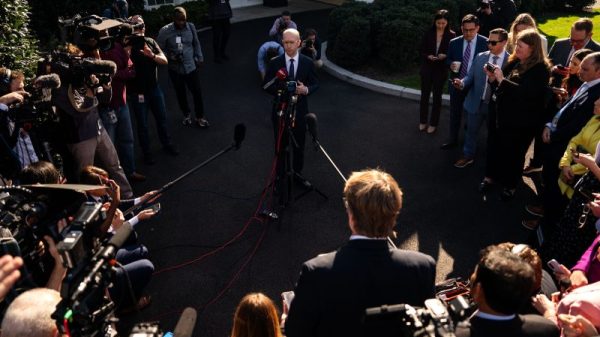The U.S. is facing a power capacity crisis as the tech sector races against China to achieve dominance in artificial intelligence, an executive leading the energy strategy of Alphabet’s Google unit said this week.
The emergence of China’s DeepSeek artificial intelligence firm sent the shares of major power companies tumbling in late January on speculation that its AI model is cheaper and more efficient. But Caroline Golin, Google’s global head of energy market development, said more power is needed now to keep up with Beijing.
“We are in a capacity crisis in this country right now, and we are in an AI race against China right now,” Golin told a conference hosted by the Nuclear Energy Institute in New York City on Tuesday.
Alphabet’s Google unit embarked four years ago on an ambitious goal to power its operations around the clock with carbon-free renewable energy, but the company faced a major obstacle that forced a turn toward nuclear power.
Google ran into a “very stark reality that we didn’t have enough capacity on the system to power our data centers in the short term and then potentially in the long term,” Golin said.
Google realized the deployment of renewables was potentially causing grid instability, and utilities were investing in carbon-emitting natural gas to back up the system, the executive said. Wind and particularly solar power have grown rapidly in the U.S., but their output depends on weather conditions.
“We learned the importance of the developing clean firm technologies,” Golin said. “We recognized that nuclear was going to be part of the portfolio.”
Last October, Google announced a deal to purchase 500 megawatts of power from a fleet of small modular nuclear reactors made by Kairos Power. Small modular reactors are advanced designs that promise to one day speed up the deployment of nuclear power because they have smaller footprints and a more streamlined manufacturing process.
Large nuclear projects in the U.S. have long been stymied by delays, cost overruns and cancellations. To date, there is no operational small modular reactor in the U.S. Google and Kairos plan to deploy their first reactor in 2030, with more units coming online through 2035.
Golin said the project with Kairos is currently in an initial test-pilot phase with other partners that she would not disclose. Kairos received permission in November from the Nuclear Regulatory Commission to build two 35-megawatt test reactors in Oak Ridge, Tennessee.
The goal is to get buy-in from partners like electric utilities to create an approach that can broadly deploy the technology, Golin said.
The nuclear industry increasingly views the growing power needs of the tech sector as a potential catalyst to restart old reactors and build new ones. Amazon announced an investment of more than $500 million in small nuclear reactors two days after Google unveiled its agreement with Kairos.
Last September, Constellation Energy said it plans to bring the nuclear reactor at Three Mile Island near Harrisburg, Pennsylvania back online through a power purchase agreement with Microsoft.
Golin said nuclear is a longer-term solution, given the reality that power capacity is needed now to keep up with China in the artificial intelligence race. “Over the next five years, nuclear doesn’t play in that space,” she said.
President Donald Trump declared a national energy emergency through executive order on his first day in office. The order cited electric grid reliability as a central concern.
Trump told the World Economic Forum in Davos, Switzerland that he would use emergency powers to expedite the construction of power plants for AI data centers.
Secretary of Energy Chris Wright issued an order on Feb. 5 that listed “the commercialization of affordable and abundant nuclear energy” as a priority.


































